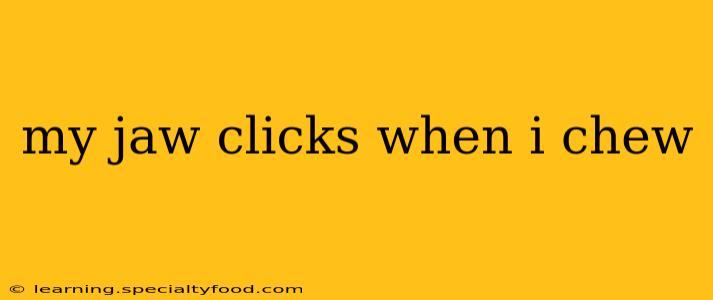Experiencing a clicking jaw while chewing is a common issue, often associated with temporomandibular joint (TMJ) disorders. This condition affects the joints connecting your jaw to your skull, and while a clicking sound isn't always a cause for alarm, it warrants attention to prevent potential complications. This comprehensive guide will explore the causes, symptoms, diagnosis, and treatment options for clicking jaws.
What Causes My Jaw to Click When I Chew?
The most common culprit behind a clicking jaw is a problem with the temporomandibular joint (TMJ). This joint is a complex structure involving the temporal bone of the skull, the mandible (jawbone), and an articular disc that acts as a cushion between the bones. A clicking sound often arises from the disc slipping out of its normal position during jaw movement. This misalignment can be caused by a variety of factors, including:
- Arthritis: Degenerative joint diseases like osteoarthritis can cause inflammation and damage to the TMJ, leading to clicking and popping.
- Injury: Trauma to the jaw, such as a blow to the face or a dislocated jaw, can disrupt the joint's mechanics.
- Muscle Disorders: Muscle imbalances or spasms in the jaw muscles can affect the joint's proper function. Bruxism (teeth grinding) and clenching are significant contributing factors.
- Genetics: A family history of TMJ disorders can increase your susceptibility.
- Stress: Psychological stress can lead to increased jaw clenching and grinding, exacerbating TMJ problems.
- Structural Issues: Certain anatomical variations in the jaw joint can predispose individuals to TMJ problems.
Is a Clicking Jaw Serious?
While a clicking jaw isn't always a serious problem, it's crucial to understand that it could be a sign of an underlying TMJ disorder. Ignoring the issue can lead to more significant complications, including:
- Increased pain: The clicking might become accompanied by more intense jaw pain, headaches, and earaches.
- Limited jaw movement: Difficulty opening or closing your mouth fully.
- Lockjaw: In severe cases, the jaw might become locked in a closed or open position.
- Degenerative changes: Prolonged TMJ dysfunction can lead to irreversible damage to the joint.
What Other Symptoms Accompany a Clicking Jaw?
Many individuals with a clicking jaw experience additional symptoms that should be monitored closely. These can include:
- Pain in the jaw, temples, or face.
- Headaches, especially tension headaches.
- Earaches or ringing in the ears (tinnitus).
- Neck pain.
- Facial pain.
- Difficulty chewing or opening your mouth wide.
- A feeling that your bite is off.
How is a Clicking Jaw Diagnosed?
Diagnosing a clicking jaw typically involves a thorough examination by a dentist or doctor specializing in TMJ disorders (orthodontist or maxillofacial surgeon). The process usually includes:
- Physical examination: The professional will assess your jaw's range of motion, palpate for tenderness, and listen for clicking or popping sounds.
- Medical history: They will gather information about your symptoms, medical history, and any potential contributing factors.
- Imaging tests: In some cases, imaging studies such as X-rays, CT scans, or MRI scans might be necessary to visualize the joint and assess its condition.
How Can I Treat a Clicking Jaw?
Treatment options for a clicking jaw vary depending on the severity of the condition and the underlying cause. Conservative management strategies are often the first line of defense, including:
- Over-the-counter pain relievers: Ibuprofen or naproxen can help manage pain and inflammation.
- Heat or ice packs: Applying heat or ice to the jaw can provide temporary relief.
- Soft food diet: Avoid chewing hard or tough foods that could strain the joint.
- Stress management techniques: Techniques such as yoga, meditation, or biofeedback can help manage stress-related jaw clenching.
- Mouth guards or splints: Custom-made mouth guards can help protect the teeth and prevent grinding, aligning the jaw joint properly.
- Physical therapy: Exercises and stretches can improve jaw muscle strength and flexibility.
If conservative measures fail to provide relief, more advanced treatments might be considered, such as:
- Injections: Corticosteroid injections can help reduce inflammation in the joint.
- Surgery: Surgery is generally reserved for severe cases that haven't responded to other treatments.
Can a Clicking Jaw Go Away on Its Own?
In some cases, a mild clicking jaw might resolve on its own, particularly if it's related to temporary muscle imbalances or minor inflammation. However, it's essential to consult a healthcare professional to rule out more serious underlying issues and receive appropriate guidance. Early intervention can often prevent the condition from worsening and potentially avoid the need for more invasive treatments.
This information is for general knowledge and does not constitute medical advice. Always consult with a qualified healthcare professional for diagnosis and treatment of any medical condition.
